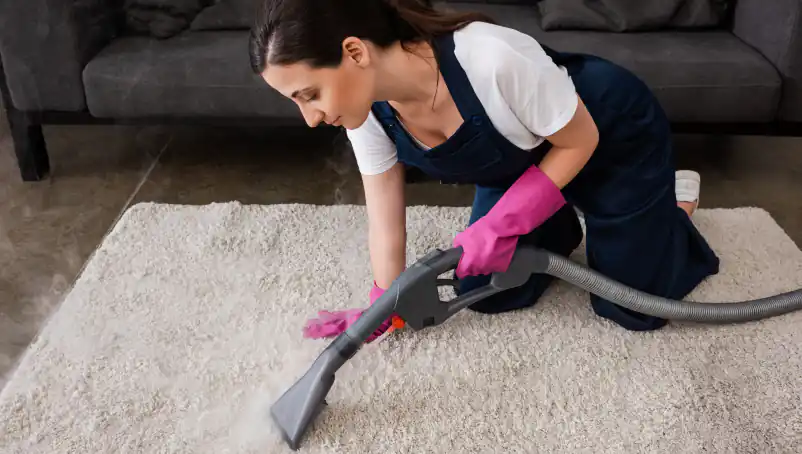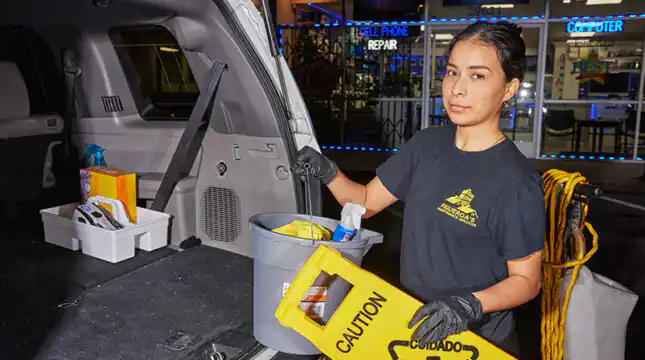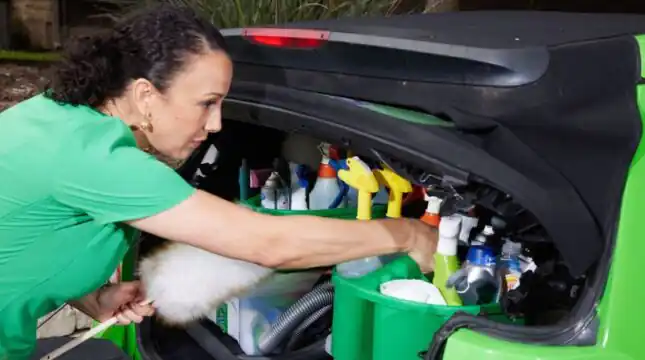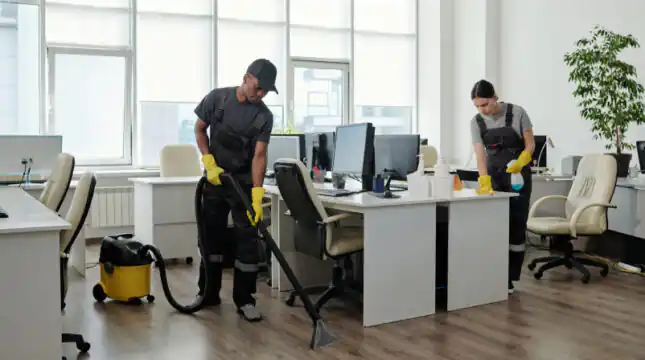How much does it cost to start a carpet cleaning business?
Starting any type of business from scratch is challenging. Equipment, licensing, registration and insurance can all add up quickly — even if you start small. But in general, most carpet cleaning businesses spend anywhere from a few thousand dollars to over $10,000 to get started. However, your costs will vary depending on factors like marketing, operational fees and equipment.
Here are some of the most common expenses to plan for:
- Business registration and licenses: Costs depend on your state, city and business structure. Some areas require additional permits for service businesses.
- Carpet cleaning equipment: Portable extractors are more affordable and ideal for homes or small spaces. Truck-mounted systems are more powerful — and more expensive — but better for high-volume jobs. Accessories like hoses, wands, gloves and cleaning solutions can add up.
- Business insurance: Depending on your setup, you may need several types of coverage. Common policies include general liability, professional liability (E&O), commercial auto and workers’ comp if you have employees. In some cases, it may be required by clients or law.
- Transportation and fuel: Whether driving your own vehicle or investing in a work van, don’t forget to factor in fuel, maintenance and commercial auto coverage.
- Marketing and branding: Website setup, digital ads, uniforms, signage and print materials can all come with upfront costs to help build your brand and bring in clients.
Tip: You don’t need to buy top-of-the-line equipment on day one. Many business owners start small — even with used gear — and reinvest as they grow.
Can I start a carpet cleaning business with no money?
It’s tough, but not impossible. While you’ll need equipment, insurance and licenses to get up and running, many entrepreneurs start small and build over time. The key is being resourceful and finding creative ways to manage early expenses. Here are a few options to consider:
- Buy used or refurbished equipment to lower upfront costs
- Rent a carpet cleaner by the job until you can invest in your own
- Take on residential jobs first, which typically require less gear
- Barter or trade services with local businesses to get help with marketing or website setup
- Partner with another local business; ask if they’d offer a small grant or upfront payment in exchange for discounted or ongoing carpet cleaning services
How to fund your carpet cleaning business
Need help covering startup costs? Here are five common ways to raise funds:
- Personal savings: A small cushion can cover licensing and used equipment.
- Friends or family: Ask for a small loan or gift to get started (just be clear about repayment).
- Small business loans or grants: Explore Small Business Administration (SBA) microloans, local programs or community grants.
- Business credit card: Useful for one-time purchases; watch interest rates.
Tip: SCORE and Small Business Development Centers can help you explore funding options for your location or industry.
How to start a carpet cleaning business in 8 steps
- Do market research
- Create a business plan
- Map out your business budget
- Legally establish your business
- Open a business bank account
- Get business insurance
- Buy carpet cleaning equipment
- Set up your home base (if working from home)
Ready to get your new carpet cleaning business off the ground? Follow these eight essential steps from idea to first paying customer — with a setup built to grow.
1. Do market research
Before you invest in equipment or build a website, take time to understand who needs carpet cleaning in your area — and what they’re willing to pay for it. For example, will you offer carpet cleaning services to busy homeowners who want stain removal on-demand? Or to local businesses with heavy foot traffic that need recurring commercial cleanings?
Look at what your competitors offer, read their reviews and identify gaps you could fill — like eco-friendly services, offering upholstery cleaning or flexible scheduling. Start by talking to neighbors, local businesses, real estate agents or property managers. The more you know about your market, the easier it is to shape services, set prices and stand out.
2. Create a business plan
Next, you’ll want to create a basic carpet cleaning business plan. Think of your business plan as a roadmap. It helps you define what kind of carpet cleaning business you want to build — and how you’ll get there. A solid plan outlines your services, startup costs, target customers, pricing and goals for growth.
It doesn’t have to be long or robust, but even a simple one can keep you focused and organized in those busy early months. If you seek funding from lenders, they’ll want to see a complete business plan with your financial plan. But even if you’re self-funded, taking time to map out your strategy can save you money (and headaches) down the road.
3. Map out your business budget
A simple budget can go a long way toward keeping your carpet cleaning company on track. It helps you plan ahead, manage cash flow and avoid overspending — especially in your early months when every dollar counts.
To build a basic budget, start with:
- Estimated income: Project what you expect to earn from carpet cleaning jobs, plus any startup capital or investments.
- Fixed costs: Recurring expenses like insurance, loan payments and marketing subscriptions.
- Variable and one-time costs: Equipment, fuel, cleaning supplies, uniforms or repairs.
Now, look at your budget and compare your income to your expenses. If you’re coming up short, look for ways to trim overhead costs. If you’re ahead, that’s money you can reinvest — maybe in better equipment, marketing or part-time help.
4. Legally establish your business
Before you can start booking clients, you’ll need to make things official. That means choosing a legal structure for your business, registering with your state or city, and securing any required licenses or permits.
- Sole proprietorship: This structure is simple and inexpensive to set up. But, your personal assets (your vehicle, house, and savings accounts) aren’t protected if your business gets sued.
- Limited liability company (LLC): This structure requires slightly more paperwork and fees, but offers more protection for your personal finances.
Once you’ve chosen your structure, you’ll need to register your business name (also called a “DBA” or “Doing Business As” in some states), apply for an Employer Identification Number (EIN) from the IRS, and check local requirements for cleaning business licenses or permits. These vary by state and city, so consult your local small business office or the SBA.
Tip: Some cities require special permits for professional carpet cleaning, especially if you’re handling water disposal or using commercial cleaning agents like certain detergents or harsh cleaning products.
5. Open a business bank account
A business bank account helps you keep your personal and business finances separate — which can protect your assets and make tax time a lot easier. It also sets you up for accurate bookkeeping and can help build your business credit history.
When choosing an account, compare fees, benefits, and features. Look for accounts with low fees, online banking tools and ATM access. Some banks also offer rewards or bonuses for accounts that meet certain deposit requirements. Once you’ve selected a bank, you can apply online or visit a local branch to open your account.
Tip: Have your EIN or Social Security Number (SSN), business formation papers, business license, and ownership agreements (if applicable) handy to speed up the process.
6. Get business insurance
Carpet cleaning comes with risks — slips, spills, equipment damage, even customer complaints. That’s why carpet cleaning insurance can be an essential part of protecting your business. In some cases, it may even be required by law or by the clients you serve.
Here are common types of coverage for carpet cleaning businesses:
General Liability insurance
General liability insurance is one of the most common types of small business insurance. This coverage helps protect you from costs if you accidentally damage someone’s property or if someone other than an employee gets hurt.
Learn more about general liability for cleaners.
Workers’ Compensation insurance
Workers’ comp coverage can help cover workplace injuries, related medical bills and lost wages. Workers’ compensation insurance is usually required by law if you have employees.
Learn more about workers’ comp for cleaners.
Errors and Omissions insurance (also called E&O)
Sometimes called professional liability insurance, errors and omissions coverage can help defend your business if you’re accused of making a mistake that leads to financial loss — for example, using the wrong product or missing a scheduled job.
Tools and Equipment insurance
This coverage can help cover repair or replacement costs if your gear is lost, stolen or damaged. NEXT offers tools and equipment coverage as an add-on to our general liability insurance for cleaning businesses.
Commercial auto insurance
If you use a vehicle for work, this commercial auto coverage can help with accidents, injuries, or property damage costs. Often required for business-owned vehicles.
Many clients — especially commercial ones — may ask for proof of insurance before hiring you. With NEXT, you can generate a Certificate of Insurance (COI) online and share it instantly from your phone.
7. Buy carpet cleaning equipment
Your equipment is the backbone of your business — especially your carpet cleaning machine. What you need depends on whether you’re targeting homes or commercial clients.
- Commercial carpet cleaning typically requires more powerful — and more expensive — gear. You’ll clean larger spaces and land steady contracts with businesses needing routine service. That means fewer clients, but bigger jobs.
- Residential carpet cleaning usually has lower startup costs. You may need to serve more customers to grow, but it’s a great way to build experience and income without a big investment.
There are generally two types of carpet cleaners.
- Portable carpet extractors: Affordable, easy to move and great for residential jobs or tight spaces like stairs and apartments.
- Truck-mount carpet cleaner: These cleaners are mounted in a van or a trailer and offer deeper cleaning and faster results, but they are expensive. They are ideal for high-volume work but come with a higher price tag.
You’ll also need to decide which type of cleaning method to offer:
- Hot water extraction (steam cleaning): Common, effective and expected by many clients.
- Dry chemical cleaning: Popular for quick-dry results.
- Dry foam cleaning: Once more common, it’s less effective and not often used by modern businesses.
Other types of cleaning tools to add to your shopping cart include hoses, wands, cricket rakes, brushes, gloves and masks.
8. Set up your home base (if working from home)
Can you start a carpet cleaning business from home? Absolutely — many successful business owners do just that, especially when they’re just getting started.
Working from home can help you keep overhead low while you build your client base. But there are a few things to think through:
- Storage space. You’ll need room for your carpet cleaning machine, accessories and cleaning solutions. A garage or shed works great — just make sure it’s secure and well-ventilated.
- Parking. If you’re using a work van or truck-mounted system, you may need to check local parking or zoning regulations to make sure it’s legal to park your vehicle at home.
- Office setup. A basic workspace for scheduling, invoicing and customer communication will help keep you organized — even if it’s just a laptop and a quiet corner.
Starting from home is a smart way to test the waters and grow at your own pace; you can always scale into commercial space later.
Smart ways to market your carpet cleaning business
You don’t need a big marketing budget to get your first few clients — just a clever mix of online presence and real-world connections. Here’s where to start:
Set up a simple website
Your website doesn’t need to be fancy, but it should be professional and easy to navigate. Include your carpet cleaning services, service area, pricing (if applicable) and contact info. Add testimonials or photos of your work as you go. You can also set it up to help you book appointments.
Tip: Make sure your site is mobile-friendly and optimized for local search by including your city or region throughout the site.
Claim your business listings and social profiles
Set up a Google Business Profile so your company shows up in local searches and on Google Maps; this is essential for getting discovered online. Also, claim profiles on Yelp, Angi and Facebook Business.
Then, create social media accounts to post updates, before-and-after photos, and seasonal cleaning promos. Focus on platforms where your target audience hangs out — usually Facebook and Instagram for residential services and LinkedIn for commercial.
Network in your local community
Word of mouth is powerful in this business. You can build a customer base through your connections and get referrals through satisfied homeowners or commercial customers. Talk to local real estate agents, property managers, contractors and other small business owners — they can refer clients your way.
You can also leave business cards or flyers at local businesses (with permission), or partner with complementary services like house cleaning or home staging.
Tap into free small business resources
The Small Business Administration (SBA) offers free resources to help you understand what’s needed to start your business and can walk you through it step-by-step. The SBA has a center dedicated to helping entrepreneurs in each state.
Check out SCORE, as well. They have free workshops and podcasts to help you start your carpet cleaning business. SCORE can also help with your marketing plan, finding a mentor and funding options.
Stay on top of your business finances: 4 key tips
Managing your money and your paperwork is just as important as cleaning carpets. Good financial habits help you stay compliant, get paid on time and prepare for tax season without the stress. Here’s what to keep in mind:
1. Track your income and expenses
Start with a simple system to monitor your cash flow — what’s coming in and what’s going out. You can begin with a spreadsheet (like Google Sheets or Excel), then switch to accounting software like QuickBooks or Wave as your business grows.
Keep digital or physical copies of all receipts, invoices, and purchase records. This is especially important for anything related to equipment, fuel or supplies.
2. Understand your tax responsibilities
As a small business owner, you’ll likely be responsible for:
- Self-employment taxes
- Quarterly estimated taxes
- State and local business taxes, if applicable
- Sales tax (depending on your location and whether your services are taxable)
It’s a lot, but don’t panic — tax software can help automate much of the process. If things get complex, consider working with a local accountant who specializes in small businesses. They can help you maximize deductions and avoid common mistakes.
3. Separate personal and business finances
If you haven’t already, open a business bank account (see step 5 above). Keeping finances separate makes tracking expenses easier, protects your personal assets, and simplifies tax prep.
You may also want to apply for a business credit card to organize recurring expenses — like fuel or supplies.
4. Consider hiring a pro
You don’t have to do it all alone. While many small business owners rely on accounting and tax software to help them stay on track, you can hire a local accountant or a tax preparer to take the task off your plate. They can help you understand how to structure your business and maximize your deductions to minimize your tax burden.
FAQs about starting a carpet cleaning business
Can I start a carpet cleaning business with no experience?
Yes, many entrepreneurs start with little or no prior industry experience. Focus on learning the equipment, customer service and basic business operations.
Is a license required to start a carpet cleaning business?
It depends. In general, you don’t need an occupational license to start a carpet cleaning business. However, you may need to get a business license and permits. Licensing requirements vary by state and city, so check with your local small business office.
How profitable is a carpet cleaning business?
Profitability depends on your pricing, equipment investment and local demand — but many small operators turn a profit within the first year, especially when starting lean.






